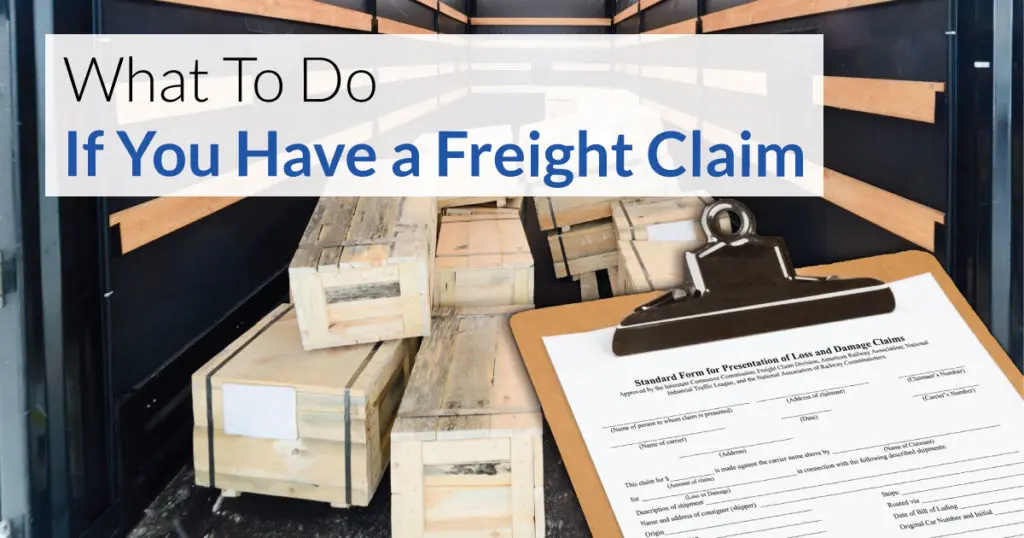When your job involves moving goods from point A to point B with countless hands touching that freight in between, it’s just a matter of when, not if, you are going to have a freight claim filed against you. So what do you do about it? We’re here to help with some tips from our Account Executives. (And 21 years of trucking experience)
What is a freight claim?
A freight claim is a legal demand by a shipper or consignee against a carrier for financial reimbursement of a lost or damaged shipment. Basically, that means if a load was lost, damaged, or part of it was missing, the receiver or the shipper wants to get their money back from the carrier who hauled that load. A freight claim may also be called a shipping claim, cargo claim, transportation claim or a loss and damage claim. Cargo claims are usually mailed and are legally required to include these 4 items:
- The specified freight shipment
- This information should be specific enough for you to be able to identify the load. An example of a shipment identifier might include a pro number, vehicle number, or the delivery date.
- The claim type
- Damage, loss, shortage, or concealed damage or shortage
- Demand for payment from you, the carrier.
- The total dollar amount of the claim.
Are you at fault?
In 1953, Congress enacted the Carmack Amendment which helps determine the liability of freight claims. When handling a freight claim, the assignment of fault between a shipper and a carrier can be a touchy issue.
The shipper must prove that the freight was in good condition when picked up and that it was damaged in transit. If that is proved, then the carrier would be responsible for the damages. For a carrier to prove that they are not the responsible party, they have to prove they were not negligent for the damaged or missing cargo. If there is no previous written agreement between a shipper or broker and the carrier, a carrier might be able to use one of the following defenses to shift the responsibility of damages off themselves.
Reasons you wouldn’t be responsible for damages:
-
An Act of God – a natural disaster or physical ailment that’s out of the truck driver’s control is the reason for damage
- Example: driver suffers from a heart attack, flooding, or a tornado
-
The Public Enemy – a hostile military force is responsible for damage
- Example: terrorist attack
-
Act of Default of Shipper – the shipper is responsible for damage
- Example: shipper loaded the truck wrong
-
Public Authority – the government is responsible for damage
- Example: product recalls, or road closures
-
The Inherent Vice or Nature of the Goods – the product itself is the reason for the damage
- Example: exempt freight items like fresh produce or newspapers that are easily damaged or decayed.
Freight Claims Process
So now that you know what a freight claim is and who can be responsible, what should you do?
-
Don’t ignore it!
If you, the carrier, don’t respond to a freight claim, you are essentially agreeing that you are at fault. Legally, you are required to pay the claim, deny it, or come to a settlement agreement. Although the terms may vary, typically freight claims must be filed within nine months of the delivery date. If a claim exceeds the nine-month time frame, liability may not be enforceable. Make sure you read over the documentation to know exactly what the dispute and terms are so you can respond to the claim within the necessary time-frame.
-
Ask for all the necessary freight claim documentation.
Because it is your responsibility to prove that you weren’t negligent when the load was hauled, you need to know all the facts. If the shipper doesn’t have all the proof to show you were negligent, like, the invoice and bill of lading, a freight claim might not be proven.
-
Communicate with your customer.
Your customer is caught in the middle between you and the shipper. Make sure to handle the situation diplomatically so you don’t end up losing your customer. Be sure to let your customer know how you plan to resolve the claim and be open and honest about any mistakes made, as well as solutions moving forward.
-
Call your insurance provider.
Cargo liability insurance is required by many brokers and shippers because, in most circumstances, it covers freight that is lost or damaged in transit. You should call your insurance provider in the event of a freight claim to make sure that your policy will cover the claim.
Freight claims can hurt your cash flow, but factoring your freight bills can help make running your business easy. And the Apex fuel card program, free load board and other advantages save you even more money. Call Apex Capital today at 1-855-369-2739 or get started here.
